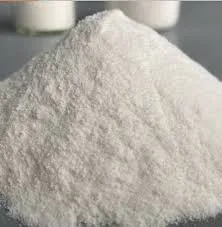
Nov . 28, 2024 00:08 Back to list
Properties and Applications of Hydroxyethylcellulose in Modern Industries and Formulations
Hydroxyethylcellulose-Based Materials An Overview
Hydroxyethylcellulose (HEC) is a non-ionic, water-soluble polymer derived from cellulose, a natural polymer sourced from the cell walls of plants. Due to its unique properties, HEC has gained significant attention in various industries, including pharmaceuticals, personal care, food, and construction. This article explores the attributes, applications, and benefits of HEC-based materials.
Properties of Hydroxyethylcellulose
HEC is characterized by its excellent film-forming ability, thickening properties, and stability under diverse conditions. It is soluble in water, and its viscosity can be easily modified by altering the concentration and molecular weight of the polymer. The ability to function effectively in both acidic and alkaline environments makes it suitable for a wide range of applications.
One of the most remarkable features of HEC is its ability to provide controlled rheological properties in formulations. When added to a liquid, HEC can increase the viscosity, thereby enhancing the texture and flow characteristics of the product. This quality is particularly valuable in products like lotions, creams, and gels, where a desirable consistency is crucial for user experience.
Applications of Hydroxyethylcellulose
1. Pharmaceuticals In the pharmaceutical industry, HEC is commonly used as a binder, thickener, and stabilizer in various formulations, including suspensions and emulsions. It helps to control the release rate of drug molecules, ensuring proper dosage and effectiveness. Moreover, HEC supports the formulation of topical drugs owing to its film-forming abilities, which enhance skin adherence and prolong the therapeutic effect.
2. Personal Care Products HEC is widely utilized in personal care formulations such as shampoos, conditioners, and skincare products. Its thickening agent role provides desired viscosity and stability, improving the sensory attributes of these products. Additionally, HEC can form a protective film on the skin or hair, offering moisturizing benefits and enhancing the overall product performance.
3. Food Industry In the food sector, hydroxyethylcellulose is employed as a thickening agent, emulsifier, and stabilizer. It is particularly useful in gluten-free baking, providing structure and mouthfeel to various baked goods. HEC’s ability to retain water also contributes to better moisture management in food products, extending their shelf life and improving texture.
hydroxyethylcellulose based

4. Construction HEC is used in construction materials such as cement and plaster as a water retention agent. It helps in controlling the workability, adhesion, and drying time of mortars and other building materials, ensuring a smooth application process. The incorporation of HEC in construction products also leads to reduced cracking and improved durability.
Benefits of HEC-Based Formulations
The use of hydroxyethylcellulose in formulations provides numerous benefits that can enhance product quality and user experience. Here are a few notable advantages
- Versatility HEC can be utilized in a wide range of applications, catering to various industries and product types. This versatility makes it a valuable ingredient for manufacturers looking to develop innovative formulations.
- Eco-Friendly As a derivative of cellulose, HEC is derived from renewable resources, making it an eco-friendly option compared to synthetic polymers. This feature appeals to environmentally conscious consumers and aligns with sustainability goals.
- Enhanced Performance The unique properties of HEC, such as its thickening and stabilizing abilities, contribute to the overall performance of formulations. This leads to higher customer satisfaction and brand loyalty.
- Non-Toxic HEC is generally regarded as safe for use in personal care and food products, contributing to the growing demand for non-toxic and hypoallergenic options in the market.
Conclusion
Hydroxyethylcellulose-based materials represent a significant advancement across multiple industries. With its versatile properties and applications, HEC offers a sustainable and effective solution for formulators aiming to improve product performance while meeting consumer demands. As research continues to explore the full potential of HEC, its impact in various sectors is expected to expand, fostering innovation and sustainability in product development.
-
Versatile Hpmc Uses in Different Industries
NewsJun.19,2025
-
Redispersible Powder's Role in Enhancing Durability of Construction Products
NewsJun.19,2025
-
Hydroxyethyl Cellulose Applications Driving Green Industrial Processes
NewsJun.19,2025
-
Exploring Different Redispersible Polymer Powder
NewsJun.19,2025
-
Choosing the Right Mortar Bonding Agent
NewsJun.19,2025
-
Applications and Significance of China Hpmc in Modern Industries
NewsJun.19,2025







